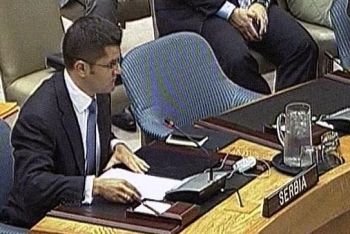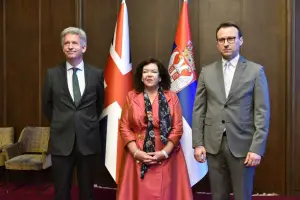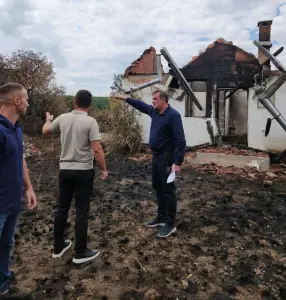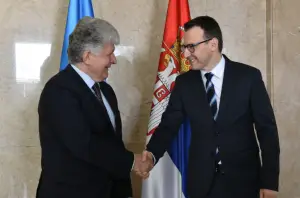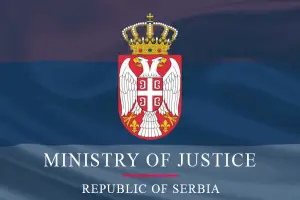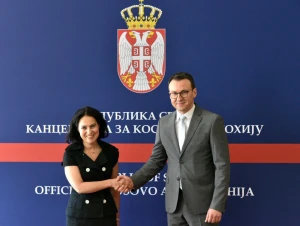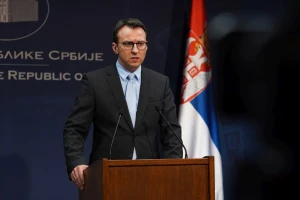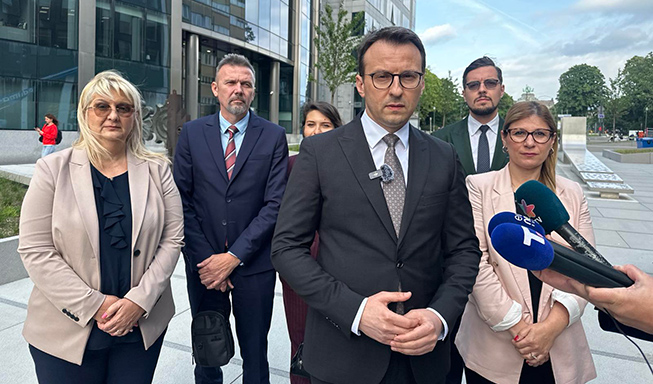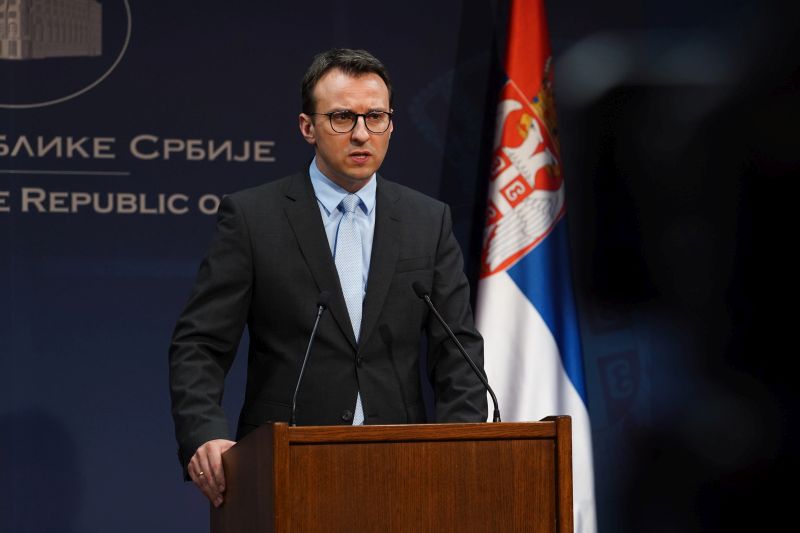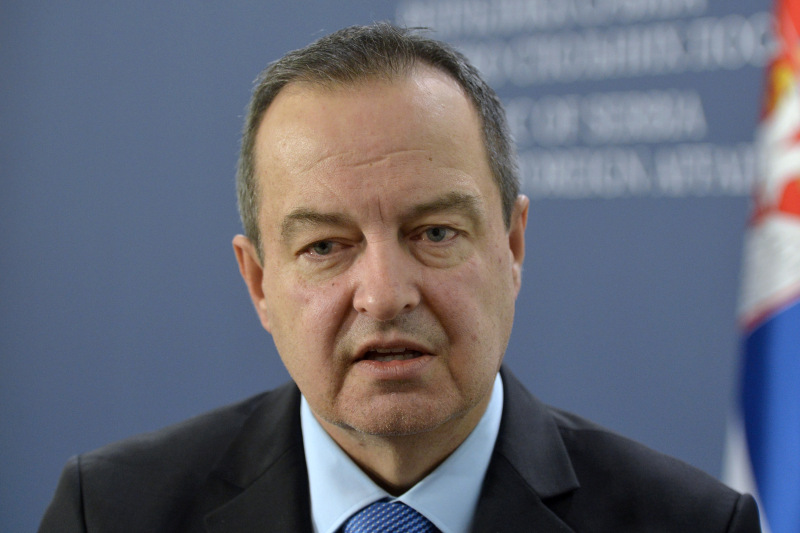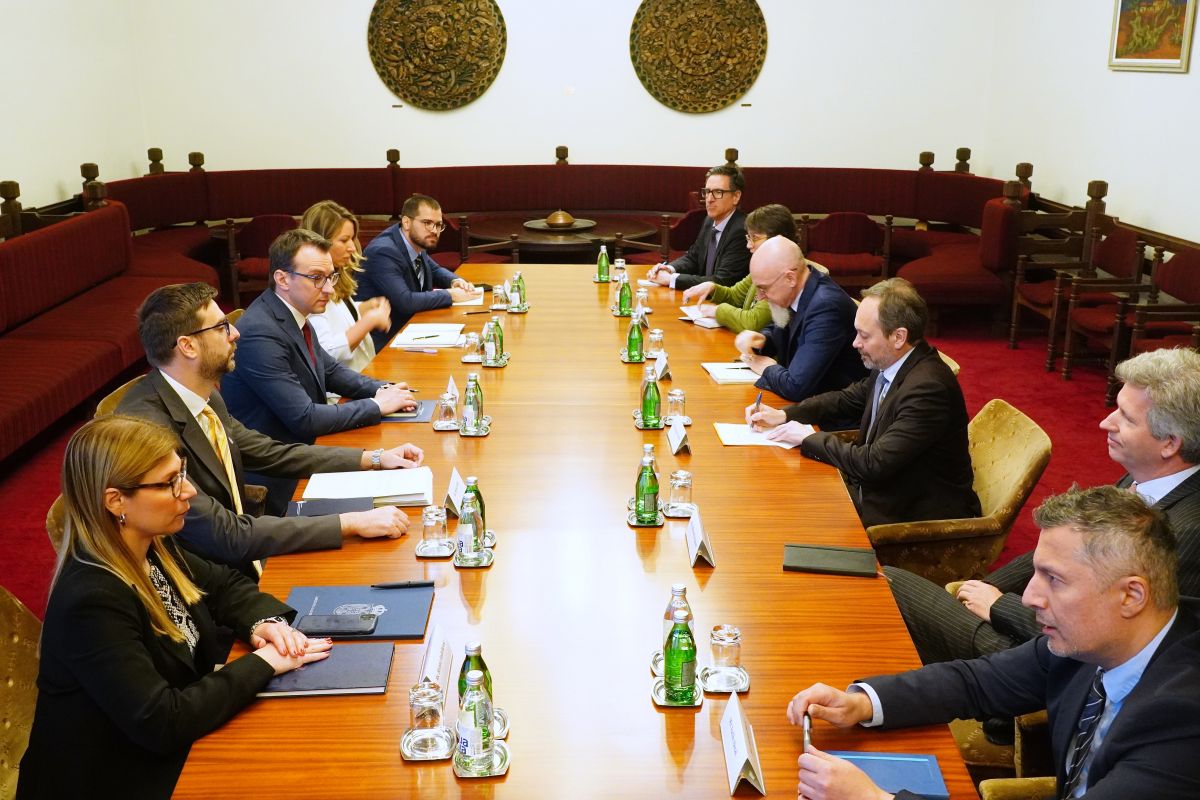Q:
A:
Pristina’s unilateral moves unacceptable
Belgrade/New York,
30 August 2011
Minister of Foreign Affairs Vuk Jeremic called on the UN Security Council to send a clear message that unilateral acts in Kosovo-Metohija are unacceptable and totally incompatible with efforts to find a mutually acceptable solution.
Jeremic addressed the UN Security Council session dedicated to the situation in Kosovo-Metohija by saying that the situation in the region is now less secure which is a direct result of unilateral moves by Pristina, adding that those who destabilise the region must be held accountable.
A month ago the situation in our region suddenly became less secure, less stable and less predictable, as a direct result of calculated decisions by secessionist ethnic Albanian leadership to make an unprovoked armed attack on the north of Kosovo as part of a sinister plan to impose the violent, illegitimate and unwanted regime to inhabitants of this part of the province, he said.
Jeremic called on the Security Council to send a clear message to perpetrators of these acts of unilateralism that their acts are completely unacceptable.
Unpunished act of sending paramilitaries of ethnic Albanians to southern Kosovo has been seen by the majority of population in the north of the province as an attempt to seize territory, he said.
He recalled that the crisis started on 25 July when the so-called ROSU unit moved across the river Ibar.
Whoever ordered the crossing of the Ibar river breached the agreement with EULEX and must bear the consequences, said the Minister.
The Serbian reaction to the raid by ROSU was quick, yet balanced, the Minister said, noting that in just a few hours the government sent an official delegation to the north of Kosovo in order to reduce tensions.
Speaking about the events that followed, Jeremic mentioned incident at one of the crossings on 27 July, which he characterised as a regrettable incident and recalled that the Serbian government strongly condemned this act of extremism.
Jeremic asked the ambassadors of UN Security Council members to give answers to very precise questions.
Who ordered the unilateral act by ROSU on 25 July? Did anyone from the international community know about the operation? Why did EULEX disappear from the north before the invasion, leaving the Serbs with no international police protection, the Minister asked.
He also asked why EULEX has not applied its extensive executive powers to the unilateral decision of Pristina.
Should we allow the attempt to create new reality on the ground through the use of force, especially when dialogue between the two sides is underway and what would be if the Serbs had taken unilateral acts, rather than ethnic Albanians, he asked.
Jeremic said that this is not the first time that the international community has not opposed the unilateral acts of Pristina and the recalled pogrom of March 2004.
He said that such behaviour cannot contribute to security in the Balkans.
The Minister also pointed to several erroneous beliefs in the public, including statements that dialogue between Belgrade and Pristina, scheduled for 20 July, was delayed by Serbia.
This is completely untrue, said Jeremic, adding that Serbia cannot accept responsibility for the decision taken by mediators in the last minute.
As another example of misunderstanding, he cited the erroneous use of the name for Serbian institutions in northern Kosovo that are referred to as "parallel structures".
Not only are they legitimate because of the fact that they are supported by the vast majority of the population, but there is no other realistic alternative that would pass the test of democracy, and the only ones that can function without permanent armed protection, said Jeremic.
The third example is the basis on which KFOR and EULEX to operate in Kosovo. The only acceptable standard, both for NATO and the EU, is UN Security Council Resolution 1244 and the status-neutral framework of the UN, he said.
Jeremic also mentioned the worrying developments in relation to the Serbian community, and indicated that the report by UN Secretary-General Ban Ki-moon shows that criminal incidents against non-Albanian communities nearly doubled during the past three months, compared to the same period last year.
The report, however, does not mention the most terrifying examples of hate crimes, despite the fact that the OSCE mission in Kosovo informed UNMIK about that in early May and again in early June, the Minister noted.
As for the political happenings in Pristina, Jeremic said that in trials for murder against some people close to Thaqi are beginning to disclose the links between public figures and organised crime.
Jeremic also commented on the Council of Europe report on trafficking in human organs in Kosovo and welcomed the contribution of EULEX in revealing the facts.
But taking and smuggling of innocent Serbian civilians took place also outside that territory. Only the kidnapping took place in the province, the Minister said, noting that EULEX cannot operate anywhere outside of Kosovo.
It is an undeniable fact that the EU mission has neither the mandate nor the time and territorial jurisdiction to investigate this case, he said.
This can be achieved only through a mechanism formed by the Security Council, the Minister said, noting that he does not expect that the discussion on the issue is concluded today.
He said that Serbia expects the appointing of a new head of the UNMIK mission soon.
Serbia will continue to actively participate in consultations to reach an acceptable appointment which will help to ensure that UNMIK continues to be a necessary pillar of peace and stability in Kosovo, he said.
Jeremic reiterated that Serbia will never recognise Kosovo's independence either explicitly or implicitly. This is the democratic will of our people and it is embodied in our Constitution, he said.
It is time to make a decision whether to seek a solution through force or through dialogue, said Jeremic, adding that unilateralism is incompatible with efforts to achieve a mutually acceptable solution to the problems in Kosovo.
Serbia is committed to peace and will continue to follow this path in spite of the horrible deterioration caused by the unilateral act of Pristina, he said.
Jeremic called on the Security Council to help make the new reality on the ground based on an agreement by the two sides reached in dialogue.
In the 21st century Balkans, the unsanctioned use of force should not create an advantage for a party that resorted to it because it would be an incentive for doing it again, concluded the Minister.
A month ago the situation in our region suddenly became less secure, less stable and less predictable, as a direct result of calculated decisions by secessionist ethnic Albanian leadership to make an unprovoked armed attack on the north of Kosovo as part of a sinister plan to impose the violent, illegitimate and unwanted regime to inhabitants of this part of the province, he said.
Jeremic called on the Security Council to send a clear message to perpetrators of these acts of unilateralism that their acts are completely unacceptable.
Unpunished act of sending paramilitaries of ethnic Albanians to southern Kosovo has been seen by the majority of population in the north of the province as an attempt to seize territory, he said.
He recalled that the crisis started on 25 July when the so-called ROSU unit moved across the river Ibar.
Whoever ordered the crossing of the Ibar river breached the agreement with EULEX and must bear the consequences, said the Minister.
The Serbian reaction to the raid by ROSU was quick, yet balanced, the Minister said, noting that in just a few hours the government sent an official delegation to the north of Kosovo in order to reduce tensions.
Speaking about the events that followed, Jeremic mentioned incident at one of the crossings on 27 July, which he characterised as a regrettable incident and recalled that the Serbian government strongly condemned this act of extremism.
Jeremic asked the ambassadors of UN Security Council members to give answers to very precise questions.
Who ordered the unilateral act by ROSU on 25 July? Did anyone from the international community know about the operation? Why did EULEX disappear from the north before the invasion, leaving the Serbs with no international police protection, the Minister asked.
He also asked why EULEX has not applied its extensive executive powers to the unilateral decision of Pristina.
Should we allow the attempt to create new reality on the ground through the use of force, especially when dialogue between the two sides is underway and what would be if the Serbs had taken unilateral acts, rather than ethnic Albanians, he asked.
Jeremic said that this is not the first time that the international community has not opposed the unilateral acts of Pristina and the recalled pogrom of March 2004.
He said that such behaviour cannot contribute to security in the Balkans.
The Minister also pointed to several erroneous beliefs in the public, including statements that dialogue between Belgrade and Pristina, scheduled for 20 July, was delayed by Serbia.
This is completely untrue, said Jeremic, adding that Serbia cannot accept responsibility for the decision taken by mediators in the last minute.
As another example of misunderstanding, he cited the erroneous use of the name for Serbian institutions in northern Kosovo that are referred to as "parallel structures".
Not only are they legitimate because of the fact that they are supported by the vast majority of the population, but there is no other realistic alternative that would pass the test of democracy, and the only ones that can function without permanent armed protection, said Jeremic.
The third example is the basis on which KFOR and EULEX to operate in Kosovo. The only acceptable standard, both for NATO and the EU, is UN Security Council Resolution 1244 and the status-neutral framework of the UN, he said.
Jeremic also mentioned the worrying developments in relation to the Serbian community, and indicated that the report by UN Secretary-General Ban Ki-moon shows that criminal incidents against non-Albanian communities nearly doubled during the past three months, compared to the same period last year.
The report, however, does not mention the most terrifying examples of hate crimes, despite the fact that the OSCE mission in Kosovo informed UNMIK about that in early May and again in early June, the Minister noted.
As for the political happenings in Pristina, Jeremic said that in trials for murder against some people close to Thaqi are beginning to disclose the links between public figures and organised crime.
Jeremic also commented on the Council of Europe report on trafficking in human organs in Kosovo and welcomed the contribution of EULEX in revealing the facts.
But taking and smuggling of innocent Serbian civilians took place also outside that territory. Only the kidnapping took place in the province, the Minister said, noting that EULEX cannot operate anywhere outside of Kosovo.
It is an undeniable fact that the EU mission has neither the mandate nor the time and territorial jurisdiction to investigate this case, he said.
This can be achieved only through a mechanism formed by the Security Council, the Minister said, noting that he does not expect that the discussion on the issue is concluded today.
He said that Serbia expects the appointing of a new head of the UNMIK mission soon.
Serbia will continue to actively participate in consultations to reach an acceptable appointment which will help to ensure that UNMIK continues to be a necessary pillar of peace and stability in Kosovo, he said.
Jeremic reiterated that Serbia will never recognise Kosovo's independence either explicitly or implicitly. This is the democratic will of our people and it is embodied in our Constitution, he said.
It is time to make a decision whether to seek a solution through force or through dialogue, said Jeremic, adding that unilateralism is incompatible with efforts to achieve a mutually acceptable solution to the problems in Kosovo.
Serbia is committed to peace and will continue to follow this path in spite of the horrible deterioration caused by the unilateral act of Pristina, he said.
Jeremic called on the Security Council to help make the new reality on the ground based on an agreement by the two sides reached in dialogue.
In the 21st century Balkans, the unsanctioned use of force should not create an advantage for a party that resorted to it because it would be an incentive for doing it again, concluded the Minister.

